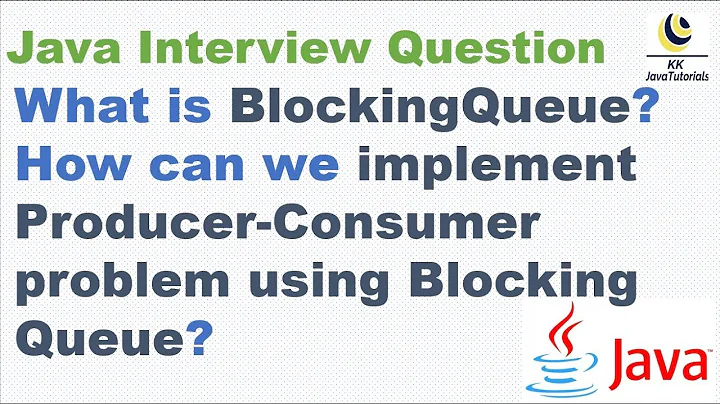Creating a Blocking Queue
Solution 1
See here:
What do I get from front() of empty std container?
Bad things happen if you call .front() on an empty container, better check .empty() first.
Try:
T pop() {
this->mutex_.lock();
T value;
if( !this->queue_.empty() )
{
value = this->queue_.front(); // undefined behavior if queue_ is empty
// may segfault, may throw, etc.
this->queue_.pop();
}
this->mutex_.unlock();
return value;
}
Note: Since atomic operations are important on this kind of queue, I'd recommend API changes:
bool pop(T &t); // returns false if there was nothing to read.
Better yet, if you're actually using this where it matters, you probably want to mark items in use before deleting in case of failure.
bool peekAndMark(T &t); // allows one "marked" item per thread
void deleteMarked(); // if an item is marked correctly, pops it.
void unmark(); // abandons the mark. (rollback)
Solution 2
The problem should lay here:
while(!itemQueue.empty()) {
itemQueue.pop();
}
You reserve the mutex when checking of a value is left, then you release the mutex and it might happen that another thread is executed, finds out that a value is left and pops it. In the worst case no item is left afterwards and the first thread tries to pop while no element is left.
The solution is to make the front/pop calls on the internal queue in the same section than the check for empty in the same locked section, then the behavior would always be defined.
Another suggestion would be to use std::lock_guard when working with mutex because it improves the readability and does ensure that the mutex is released no matter what happens.
Considering the fact those two advice, your pop method could look like:
T pop() {
std::lock_guard lock(this->mutex_); //mutex_ is locked
T value;
if( !this->queue_.empty() )
{
value = this->queue_.front();
this->queue_.pop();
}
return value;
} //mutex_ is freed
Related videos on Youtube
Comments
-
 Chris Redford almost 2 years
Chris Redford almost 2 yearsSometimes this implementation and execution of
BlockingQueuejust works. Sometimes it segfaults. Any idea why?#include <thread> using std::thread; #include <mutex> using std::mutex; #include <iostream> using std::cout; using std::endl; #include <queue> using std::queue; #include <string> using std::string; using std::to_string; #include <functional> using std::ref; template <typename T> class BlockingQueue { private: mutex mutex_; queue<T> queue_; public: T pop() { this->mutex_.lock(); T value = this->queue_.front(); this->queue_.pop(); this->mutex_.unlock(); return value; } void push(T value) { this->mutex_.lock(); this->queue_.push(value); this->mutex_.unlock(); } bool empty() { this->mutex_.lock(); bool check = this->queue_.empty(); this->mutex_.unlock(); return check; } }; void fillWorkQueue(BlockingQueue<string>& workQueue) { int size = 40000; for(int i = 0; i < size; i++) workQueue.push(to_string(i)); } void doWork(BlockingQueue<string>& workQueue) { while(!workQueue.empty()) { workQueue.pop(); } } void multiThreaded() { BlockingQueue<string> workQueue; fillWorkQueue(workQueue); thread t1(doWork, ref(workQueue)); thread t2(doWork, ref(workQueue)); t1.join(); t2.join(); cout << "done\n"; } int main() { cout << endl; // Multi Threaded cout << "multiThreaded\n"; multiThreaded(); cout << endl; }-
 Admin almost 10 yearsIf it segfaults, I assume you could get the line of code where it happens? Might just be helpful to know...
Admin almost 10 yearsIf it segfaults, I assume you could get the line of code where it happens? Might just be helpful to know... -
UldisK almost 10 yearsWhat happens if you check if the
itemQueueis empty, then let other thread do some work and thenpop()an item? -
 Flexo almost 10 yearsThis question has enough code that anyone can try it out and see for themselves where the problem is. There isn't much superfluous code either, so it's not far off a textbook SSCCE and certainly answerable.
Flexo almost 10 yearsThis question has enough code that anyone can try it out and see for themselves where the problem is. There isn't much superfluous code either, so it's not far off a textbook SSCCE and certainly answerable. -
 Casey almost 10 years@Flexo I have a hard time believing that "Where is the bug in this program?" could ever be a good question.
Casey almost 10 years@Flexo I have a hard time believing that "Where is the bug in this program?" could ever be a good question. -
 Flexo almost 10 years
Flexo almost 10 years
-
-
 Admin almost 10 years@πάνταῥεῖ Actually, I just eschew
Admin almost 10 years@πάνταῥεῖ Actually, I just eschewstd::and C++ myself. Far rather work with C++/CLI, C#, C, Java, anything really except for vanilla C++ and STL. Any language defining exception as an unsafe misfeature deserves a miss in my book. I mean who implements an empty queue read as segfault?! -
 πάντα ῥεῖ almost 10 yearsTo implement Lock/Unlock sequences this way in c++ is error prone (and may be in other languages), since it's not exception safe. You can either use one of the
πάντα ῥεῖ almost 10 yearsTo implement Lock/Unlock sequences this way in c++ is error prone (and may be in other languages), since it's not exception safe. You can either use one of thestd:lock_guardidioms provided by the c++ standard, or roll you own, if necessary easily! -
 Chris Redford almost 10 years@ebyrob I agree on the API change. It is a good solution to avoiding the "what to use as the default value" problem.
Chris Redford almost 10 years@ebyrob I agree on the API change. It is a good solution to avoiding the "what to use as the default value" problem. -
 πάντα ῥεῖ almost 10 years+1 Just mention a standard or custom auto locker mechanism, and your answer should be perfect, though of the low quality question!
πάντα ῥεῖ almost 10 years+1 Just mention a standard or custom auto locker mechanism, and your answer should be perfect, though of the low quality question! -
 Admin almost 10 yearsAnd what happens if itemQueue is empty? segfault, or exception, or undefined behavior. I believe the
Admin almost 10 yearsAnd what happens if itemQueue is empty? segfault, or exception, or undefined behavior. I believe thestd::queue.front()behavior is the surprise here not that threads preempt each other. If you had mentioned it explicitly I wouldn't have bothered with an answer. -
 πάντα ῥεῖ almost 10 years@ebyrob
πάντα ῥεῖ almost 10 years@ebyrobthis->mutex_.lock()/this->mutex_.unlock();You shouldn't do this directly! Use an appropriate scoped construction/destruction idiom instead! -
 Chris Redford almost 10 yearsOkay @πάνταῥεῖ. I do agree that using
Chris Redford almost 10 yearsOkay @πάνταῥεῖ. I do agree that usingunique_lock<mutex> lock(this->mutex_)results in more readable code. -
 Theolodis almost 10 years@ebyrob I am talking about the
Theolodis almost 10 years@ebyrob I am talking about thepopmethod he implemented. -
 Admin almost 10 years@Theolodis
Admin almost 10 years@TheolodisT value;Seriously? It seems like you copy-pasted my code. -
 Admin almost 10 years@πάνταῥεῖ Sorry for being slow, I had to think about this a bit. You seem to attribute those 2 lines of code to me just because I kept them in my answer. I, very clearly, copy-pasted them from the question. Being a bit of an outsider to C++, it was very clear to me the misunderstanding about how
Admin almost 10 years@πάνταῥεῖ Sorry for being slow, I had to think about this a bit. You seem to attribute those 2 lines of code to me just because I kept them in my answer. I, very clearly, copy-pasted them from the question. Being a bit of an outsider to C++, it was very clear to me the misunderstanding about how.front()works. So, I chose to highlight pitfalls I am familiar with. I don't really know enough aboutlock_guardto comment. So I won't. Really, withstd::stringthe only exception possible is out of memory. That should probably be fatal in most simple programs anyway. -
 Killzone Kid over 6 yearsdid you mean
Killzone Kid over 6 yearsdid you meanstd::lock_guard<std::mutex> lock(this->mutex_);? -
 Theolodis over 6 years@KillzoneKid depends on the mutex type you use.
Theolodis over 6 years@KillzoneKid depends on the mutex type you use.




